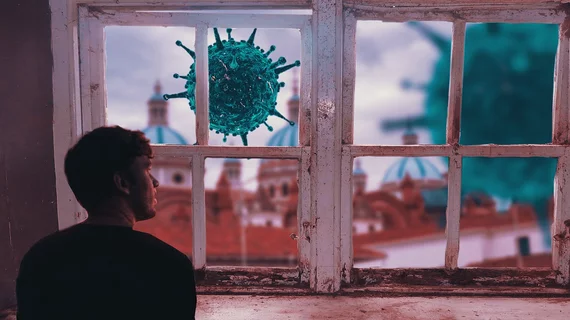Radiologists battling insomnia, depression and anxiety amid pandemic, but a few factors appear protective
Radiologists are grappling with symptoms of insomnia, anxiety and depression during the pandemic, with a few key factors influencing such mental health challenges.
Working in a public hospital appears to be a “major protective factor” against all three, French imaging experts reported Tuesday in the European Journal of Radiology. And restricted access to education, personal medical history, and working in a high-density area were all shared factors of anxiety or depression.
Researchers polled hundreds of French radiologists to reach their conclusions, which suggest that action is needed to protect the profession.
“Given that radiologists are a population at risk to develop stress at work, as has been demonstrated in several studies, our findings would drive to implement protective measures,” lead author Marie Florin, MD, a radiologist with the Georges Pompidou European Hospital in Paris, and colleagues wrote Sept. 15. “Radiologists working in private practice, in a high COVID-19 density area, managing patients with COVID-19 and with past medical history seemed to be the most at risk and should be closely monitored. Access to medical education via webinar or e-learning should be emphasized.”
All told, 1,515 radiologists took the anonymous survey, administered between April 10 to 19. Emailed to members of five separate medical societies, the respondents included residents and board-certified rads from academia, nonteaching public hospitals and private practices.
Almost 41% of physicians said they had experienced symptoms of insomnia, while 35% dealt with signs of anxiety and almost 31% displayed traits of depression. And respondents self-reported clinically significant cases of these conditions 12%-15% of the time, Florin and colleagues discovered.
Radiologists working in private practice were “significantly” more likely to experience insomnia and depression. Speculating on the reason for this disparity, the authors noted that greater than 75% of physicians in this domain experienced a decrease in their work amid shelter-in-place orders and halts to elective imaging.
Many private practices were forced to close. But greater burden of psychological stress appeared to persist, even when removing work declines as a factor, the authors noted. Private practice radiologists may be more concerned about possible permanent closure of their businesses. And other factors could include lack of personal protective equipment, a lesser feeling of self-worth, and isolation (43% reported feelings of the latter).
“The apparent protective effect of working in public hospitals may conversely be related to the more frequent feeling of usefulness for hospital radiologists,” Marin et al. wrote. “Different occupational stress models suggest that the impact of constraints on mental health can be offset by increased rewards. Among these, the societal praise of care work provided by hospital workers appears as a possible short-term protective factor.”
You can read much more from the analysis in EJR here. Another recent survey out of the University of Southern California reported similar findings among U.S. radiologists.

